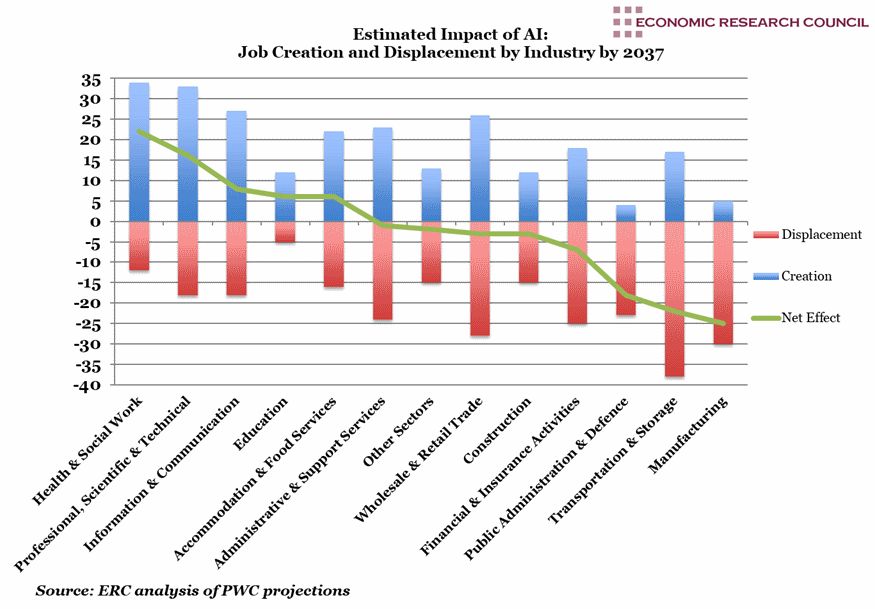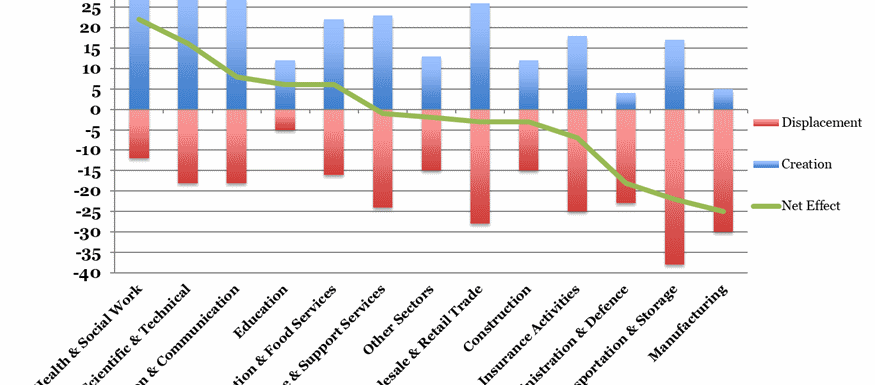
Summary
The chart shows the estimated impact of Artificial Intelligence (AI) on job creation in the UK is an average of 18.9% and job displacement to be an average of 20.5%, with an average net effect of -1.77%. The health and social work sector has the most positive outlook, with jobs created estimated to be nearly 1 million. This represents approximately 20% of existing jobs in the sector (in 2017). The manufacturing industry is projected to experience the greatest reduction, potentially shrinking by a quarter – a loss of almost 700,000 jobs. The wholesale and retail sector sees the most movement, with significantly high levels of both job creation and displacement, 26% and 28% respectively. Education appears least affected with job creation and displacement at 12% and 5% respectively.
What does the chart show?
The chart shows estimates of AI’s impact on job creation and displacement in the UK by 2037. The forecasts are not estimates of total UK employment, but rather the potential impact of AI as one factor. The red bars indicate the percentage of jobs lost to AI and the blue bars signify the percentage of jobs created by AI. The projections are for 2037. The green line displays the net effect of AI on jobs as a percentage. The data originates from PWC’s UK Economic Outlook, published in July 2018.
Why is the chart interesting?
Recent advances in artificial intelligence have been incorporating cognitive skills that show potential to supersede human ability. Although the potential is vast, there will be attendant job insecurity in many industries, with many of those laid off lacking the necessary skills to benefit from the jobs AI creates.
The health and social work industry is projected to experience the highest net job gains, and, separately, is anticipated to grow overall as a result of an aging population. While routine imaging and diagnosis may be automated, patients will continue to require and value the “human touch”. The same applies to the personal interaction required in education, a sector where technology for the replacement of many functions undertaken by educators has existed for many years. For creative subjects such as arts and music, AI capability remains lacking. In the professional, scientific and technical sector, the chart shows that jobs created could be double the number of jobs displaced. These jobs would likely be due to the burgeoning need for AI itself, and involve the operation and design AI technology for a variety of sectors.
The industries that can expect significant net job losses are those with routine and repetitive tasks, as seen in the projection for the manufacturing as well as the transportation and storage sectors. Regarding the latter, the potential of driverless cars and automated warehouses is evident today and indeed already cutting the number of humans required in the industry. Similarly, in manufacturing, the use of algorithms and robotics is already making many routine factory tasks redundant. Fields such as cyber security and drone design can create jobs in the public administration and defence sector, but is offset in employment terms by the the automation of clerical roles.
AI not only impacts individual employment, but also has many policy implications. The government published the “AI Sector Deal” in April earlier this year, which combines an array of policies in order to negate the displacement effect. The government could invest more in the promotion of STEM (science, technology, engineering and mathematics) skills among workers and students alike in order to create a more appropriately skilled workforce. However, those who are unable to adapt to this changing dynamic, may find themselves short-changed while many experience both increased wealth and leisure time. The report from which this data is drawn posits Universal Basic Income as a method by which the incomes of those who have lost out due to a lack of skills can be stabilised. Furthermore, investing in sectors where job creation and business growth has high potential, such as in university research centres and science parks could prove beneficial in supporting digital start-ups, expanding their digital infrastructure and stimulating competition in line with the government’s industrial strategy.
Week 37, 2018

